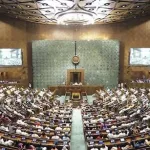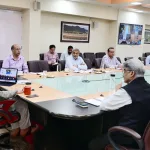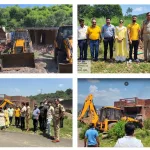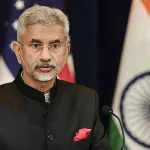Nahida Mushtaq
The Pashtun community, often referred to as Pashtuns, Pashtoons, or Pathaans, has a deep-rooted connection with the Kashmir region. Their native language is Pashto, and they exhibit linguistic versatility, being proficient in languages like Kashmiri, English, Gojri, Pahadi, and more. Pashtuns initially arrived during Afghan rule, with many brought by Maharaja Gulab Singh during the Dogra rule to serve on the border. Presently, they are predominantly concentrated in the southwest region of Jammu. Additionally, there are significant populations of nomadic Pashtun clans in both northern and southern parts of the state of Jammu and Kashmir. In Jammu, they can be found mainly in Poonch District and Jammu District, and they are known to speak Dogri, a Punjabi dialect, alongside Pashto. In the northern part of the state, particularly in districts like Bandipora and Baramulla, Pashto is also spoken. In the southern region of Kashmir, Pashto is prevalent, especially in Ganderbal District, with two villages being particularly known for this.
The presence of Pashtuns in Kashmir is deeply intertwined with its history, closely linked to India’s struggle for independence. In 1931, elders of the Pashtun community began migrating to Kashmir valley from places like Afghanistan and Pakistan, seeking better opportunities and a new life in the region. This migration coincided with the fervor of the Indian independence movement, and the Pashtun community played a vital role in this fight for freedom. Prominent figures like Gaffar Khan, affectionately known as “Pathaan,” emerged as influential leaders, dedicating themselves to the cause of independence.
After India gained independence, many Pashtun elders who were previously engaged in businesses such as selling dry fruits chose to stay in Kashmir. The warmth and acceptance they received from the local people encouraged them to make this region their home. Visionary leaders like Bakshi Ghulam Mohammad and Jawaharlal Nehru recognized the value of this diverse community and encouraged their settlement in the region, despite the differences in language.
Presently, the Pashtun community faces a predicament stemming from historical reclassifications and survey categorizations, resulting in a lack of a distinct identity. This situation was exacerbated by their exclusion from the Scheduled Tribe (ST) or backward categories within the Mandal Commission, despite their tribal origins and rich cultural heritage. In an attempt to rectify this, some individuals within the community adopted surnames like “Pathaan” or “Gujar” to access associated category benefits. However, these efforts failed to secure a separate identity or rightful recognition.
Nazeer Ahmad Masoodi, a leader from Ganderbal, played a pivotal role in uniting various tribal communities, including the Pashtun community, under the banner of a “Pahadi community” due to their shared use of the Pahadi language. This collaborative effort led to the formation of the “Pahadi Athenic Group,” with active participation from the Pashtun community in cultural activities and scholarships. Despite this progress, Pashtun community members faced significant challenges in preserving their Pashto language and obtaining ST certificates.
Concerns persist regarding the sustainability of this recognition, given the Pashtun community’s unique cultural heritage, tribal origins, and inherent backwardness. The community is puzzled by the difficulty its representatives face in securing employment, especially when they once had a presence and broadcasts in Pashto on Radio Kashmir. Radio Kashmir Srinagar commenced broadcasting news in the Pashto language, a practice that endured until around 1965 or 1966. This acknowledgment of their language on a prominent platform underscored its significance. In 1976, another significant development occurred when the community was reclassified into a different backward class. Regrettably, the common Pashtuns remained unaware of this alteration, which would have enduring consequences.
In 1986, central authorities conducted a survey to classify communities into “Ethenic groups.” This survey led to the misclassification of people other than Kashmiris as “Gujar,” erroneously encompassing the Pashtun community. This misclassification erased their distinct identity and rich cultural heritage, posing a challenge to their recognition and representation.
Notwithstanding these challenges, historical records trace the presence of Pashtuns in the region as far back as 1921.
The community now seeks recognition within cultural academies and universities, with the establishment of a dedicated department for their language. Additionally, they aim to regain their place on Radio Kashmir to preserve and promote their rich language and culture. The Pashtun community continues to grapple with multiple challenges, particularly in education, where students typically receive only limited schooling, forcing many into daily wage labor due to limited job opportunities. The struggle for ST certification remains unresolved, as their cultural heritage and backward status are not adequately acknowledged.Despite these hardships, the Pashtun community remains committed to their country, seeking recognition, representation, and opportunities to uplift their community and preserve their language and culture.
In recent times, Zaffar Iqbal from the Pashtun community took the initiative to address their challenges by proposing a program in Pashto language, similar to that of the Gujars, to the Chief Minister of the region. However, the government’s response was disappointing as they could not allocate the requested posts, despite Zaffar Iqbal’s dedicated efforts. This highlights a stark contrast with other tribal communities like the Gujars and Pahadies, who have achieved separate category recognition and representation in the Raj Sabha.
The Pashtun community believes that with genuine government interest and support, there is hope for improving their condition. They aspire to enhance their language’s historical significance and have dedicated representatives to advocate for their interests, similar to Haji Meer Ahmad Naqshbandi’s role in the past. In their pursuit of recognition and advancement, the Pashtun community reaches out to those willing to listen and support their cause. Despite being a small community in Kashmir, they have displayed remarkable resilience and produced exceptional individuals who have made significant contributions in various fields despite the daily challenges they face.
In 1957, a pivotal development unfolded with the establishment of the social welfare department, conferring special category status upon the Pashtun community as a backward tribe. This recognition was rooted in their historical reliance on animal husbandry for sustenance, opening doors to job opportunities and enhancing their children’s education through scholarships and post-middle school employment prospects.
As time advanced, the educational shortcomings of the community began to impede their progress. Despite their substantial contributions to the region, they faced ongoing challenges, particularly the absence of educational resources, including schools in their rugged mountainous areas. The Pashtun community continued to adapt to changing circumstances.
In 1970, significant alterations in the Pashtun community’s status and classification came to the fore. Until that point, the community had enjoyed a 12% reservation within a specific backward class category. However, they remained uninformed about the specifics of these benefits, which encompassed scholarships and other forms of assistance for their children.
While the community’s representation remains modest, these individuals stand as beacons of hope and inspiration for the Pashtun people. Among the notable personalities who have made a profound impact in the Pashtun community are figures like Zulfiqar Aalam Khan, a lawyer, Shoaib Khan, an Assistant Professor, Jahangeer Ahmad Khan, a Pahari Announcer at Aakaash Vani Srinagar, and Bashir Ahmed Khan, a retired teacher. These few names have become a wellspring of hope and inspiration for all Pashtun people in Kashmir.





